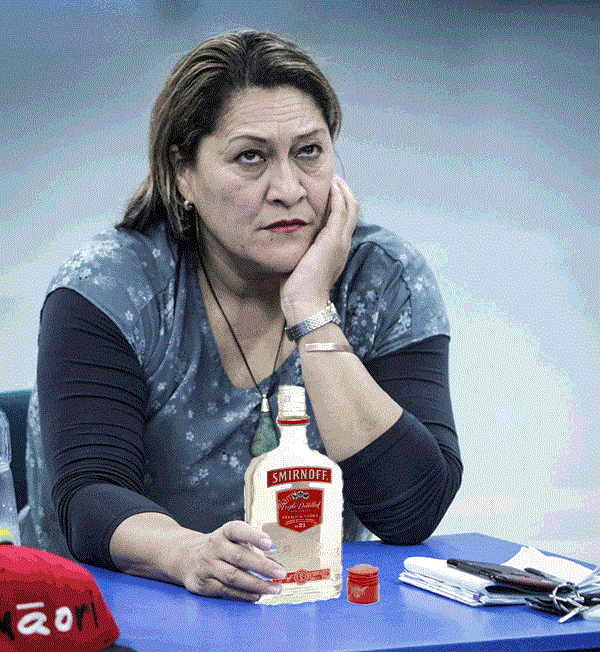(Photoshop credit: Kayla Chamberlain)
It’s not a secret to VJM Publishing readers that there is a great love of cannabis among the Maori population. The Maori people were never convinced that cannabis prohibition was a good idea, and they were always more heavily impacted by the enforcement of the law than non-Maoris. So why don’t Maori leaders represent their people when it comes to changing the cannabis laws? This essay explains.
Dan McGlashan showed in Understanding New Zealand that there was an extremely strong correlation between being Maori and voting for the Aotearoa Legalise Cannabis Party in 2017: 0.91. This is one of the strongest correlations between any two factors in New Zealand society, even stronger than the correlation between personal income and voting ACT, or being on the unemployment benefit and voting Labour.
So those of us in the know were not at all surprised by the Horizon Research poll announced yesterday, which stated that 75% of Maori voters intend to vote to legalise cannabis when the referendum comes around. Moreover, of the remainder, only 14% intended to vote no, with 11% being unsure. This means that up to 86% of Maoris would vote yes on the referendum if it were held tomorrow.
The question arises, however: if a vast majority of Maoris support legal cannabis, why are Maori leaders so pathetically gutless on this issue?
First of all, it should be pointed out that the bulk of non-Maori leaders are equally as cowardly, so it’s partly a disease of our own political class. Jacinda Ardern and Andrew Little have also been pathetic on this issue, as has every member of the National Party. Cowardice is a characteristic feature of New Zealand politicians, and when it comes to cannabis this seems to double.
However, the bulk of non-Maori leaders are not representing a population as heavily impacted by cannabis prohibition as Maori leaders are. The British settlers were long since used to alcohol, but for the Maoris its introduction was akin to the deployment of a bioweapon. This makes the need for cannabis law reform more pressing for Maoris, and thereby the current crop of Maori leaders more negligent than the others.
Secondly, it’s also a fact that young people are much more likely to favour cannabis law reform than the old ones who suffered most of the propaganda. Again as shown by McGlashan, the correlation between median age and voting for the Aotearoa Legalise Cannabis Party in 2014 was -0.55, which supports the Horizon Research poll suggesting that Maoris under 55 years of age are much more likely to support legalisation.
Most of the Members of Parliament who are Maori are old, so it can be seen that their attitudes are very likely the same prejudices against cannabis held by other old people. After all, they all went through the same reefer madness brainwashing as the other old people. At least part of the failure of Maori leaders on this issue can be attributed to the general failure of the Boomer generation to appreciate the perspectives of other generations. They’re simply out of touch.
Thirdly – and this is a very sad and depressing fact – there is a lot of lobbyist money from anti-cannabis sources flowing into the coffers of various politicians. A previous study here at VJM Publishing showed that at least 7% of National Party funding came directly from alcohol manufacturers and their associations, and those groups will have leaned heavily on the recipients to vote against any recreational alternative to alcohol.
We can’t say that any of these Maori leaders are taking money from alcohol, tobacco or pharmaceutical interests, because we don’t have any evidence for that. But there is a fuckton of anti-cannabis lobbyist money and these politicians are taking positions consistent with what the lobbyists want them to take. They’re certainly signalling a willingness to take money from such lobbyists. Ockham’s Razor would suggest that we at least be suspicious.
All of this helps to explain why Willie Jackson, Peeni Henare, Meka Whaitiri, and all the Maori members of the New Zealand First caucus voted against Chloe Swarbrick’s medicinal cannabis bill. Basically, they don’t give a shit about the reality of life on the ground for the average Maori, they just want their votes on the way to the Parliament trough.
The reality of life on the ground is that a great proportion of the Maori people have taken to cannabis because it’s a recreational alternative to alcohol. The arrival of alcohol had a similar effect on Maoris as it did on most New World people suddenly exposed to it: utter carnage, and they are smart enough to have learned that a session on cannabis tends up to end up much happier than a booze one.
We can’t realistically expect courage or leadership from a New Zealand politician, but we can at least expect them to understand and acknowledge when the winds of opinion have changed among the people they’re supposed to be representing, and to act accordingly. Maori leaders need to come out and publicly state that cannabis law reform is the way forward, not just for their constituents but for the entire nation.
*
If you enjoyed reading this essay, you can get a compilation of the Best VJMP Essays and Articles of 2018 from Amazon for Kindle or Amazon for CreateSpace (for international readers), or TradeMe (for Kiwis). A compilation of the Best VJMP Essays and Articles of 2017 is also available.

